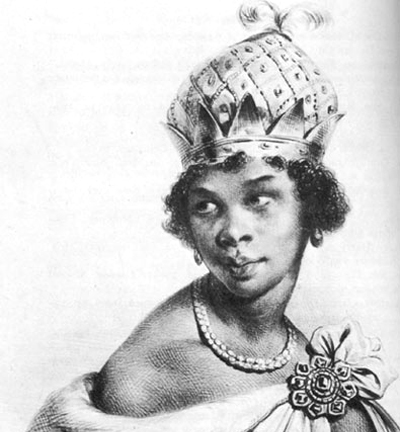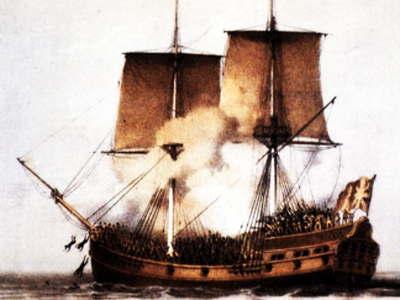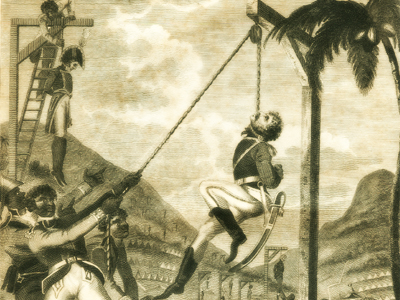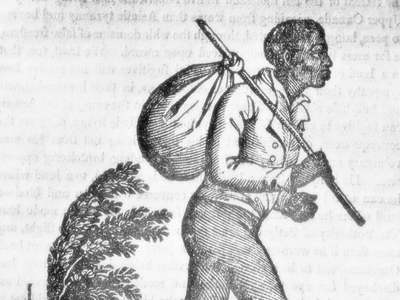|
Resistance and Rebellion
"If any man should buy another man and compel him to his service and slavery without any agreement of that man to serve him, the enslaver is a robber and a defrauder of that man everyday. Wherefore it is as much the duty of a man who is robbed in that manner to get out of the hands of his enslaver as it is for any honest community of men to get out of the hands of rogues and villains."
Ottobah Cuguano
|
Background
African resistance to enslavement had a huge impact on the abolition movement. From the moment of capture to arrival in the Americas, Africans sought ways to escape and to fight back. The authorities responded to these acts through violence and repression, and the constant threat of uprisings or their actual occurrence meant there was an almost continuous state of war in the Caribbean at the end of the 18th century.
|
 Queen Ngola Ann Nzinga of Ndongo Angolan who defended Angolans against the Slave Trade
© Every Generation Media www.whenweruled.com
| |
CB Wadstrom, a Swedish abolitionist, witnessed the slave trade in Africa, and observed how Africans tried to resist kidnapping:
"The King of Almammay enacted a law that no slave whatsoever should be marched through his territories…he returned presents to the Senegal Company, declaring that all the riches of that company should not divert him from his design".
No matter how violent or brutal the consequences, enslaved Africans took any opportunity to free themselves, or harm those who had enslaved them -"A few years ago, a most shocking murder was committed by the Negroes on a medical gentleman of acknowledged worth and humanity", William Dickson wrote to Edward Hay, former governor of Barbados, "it appeared extraordinary that the doctor, although murdered, was not robbed";.
|
 Revolt Aboard Slave Ship 1787, William Fox
© The Atlantic Slave Trade and Slave Life in the Americas: A Visual Record
| |
The pamphlets are full of stories of African rebellions on the rivers and the coast, which demonstrated how Africans sought every opportunity to free themselves. CB Wadstrom records an act of revenge by Africans when an English slaving ship, which had kidnapped a number of Africans and sailed away, was "driven back to the coast from whence they came".
"The natives, ever since the transactions were determined to retaliate, they boarded the vessel and having made themselves master [of the ship] killed most of their crew", he wrote.
|
 Depiction of the Haitian revolution 1791
© Anti-Slavery International
| |
En route to the Americas, the slavers remained vigilant to the fact that Africans could rise up at any opportunity, this required weapons to be trained on the slave holds at all times and the most brutal forms of repression to be employed. Uprisings occurred on at least 8 of every 10 voyages, always ending in bloodshed. In 1752, the Africans on board the Marlborough of Bristol, which was transporting Africans from the Gold Coast and Bonny, rose up and killed 33 of the 35 crew. They kept the two remaining crew members to assist with navigation and ordered them to return the ship back to Bonny. The Gold Coast Africans objected to this however, and 98 people were killed in the ensuing clash.
In the Caribbean and Americas sabotage of machinery and equipment, poisonings, feigning illness, killing livestock, infanticide and full blown organised uprisings were ways in which enslaved Africans resisted their condition. The enslaved Africans in St Domingue (today’s Haiti) took control of the island in 1791 and defeated the French, British and Spanish armies during a bloody 12 year war. Escaped slaves in Jamaica and Surinam established communities in the mountainous regions of their islands and waged guerrilla wars against the authorities. Other insurrections like Tacky’s Revolt in Jamaica in 1760, and Fedon’s in Grenada in 1795, inspired other enslaved Africans to rebel, and these revolts were regularly reported in the British press which began to wake the public up to the fact that the enslaved wanted their freedom.
|
 Depiction of a runaway slave which was often used in notices offering a reward for their return. Escaping slavery was a difficult and dangerous endeavour, which on recapture would be severely punished, and could be fatal, but the desire to find freedom was powerful and consuming.
|
Narratives from the Collection
Observations on the slave trade from the coast of Guinea, during a voyage made in 1787 and 1788
Letters on slavery, by William Dickson, formerly private secretary to the late Hon. Edward Hay, Governor of Barbados
An abstract of the evidence delivered before a select committee of the House of Commons in the years 1790 and 1791, on the part of the petitioners for the abolition of the slave trade
A memoir of transactions that took place in St. Domingo in the spring of 1799; affording an idea of the present state of that country the real character of its black governor Toussaint L'�Ouverture, and the safety of out West India Islands from attack or revolt, including the rescue of a British officer under sentence of death, by Captain Rainsford
An enquiry: which of the two parties is best entitled to freedom? The slave or the slave holder, from an impartial examination of the conduct of each party at the bar of public justice (London 1824)
A particular account of the commencement and progress of the insurrection of the Negroes in St Domingo, which began August 1791
Account of a shooting excursion on the mountains near Dromilly Estate in the parish of Trelawny, and island of Jamaica in the month of October 1824
Report of the proceedings against the late Rev. J. Smith of Demerara, who was tried under martial law and condemned to death, on a charge of aiding and assisting in a rebellion of the Negro slaves
Remarks upon a letter addressed by M. Mazeres, a French ex colonist, to JCL Sismonde de Sismondi, containing observations on the blacks and whites, the civilisation of Africa, the kingdom of Hayti etc.
The West Indies as they are; or, a real picture of slavery: but more particularly as it exists in the island of Jamaica, in three parts, by the Rev. R Bickell
|
Test Your Knowledge
|

